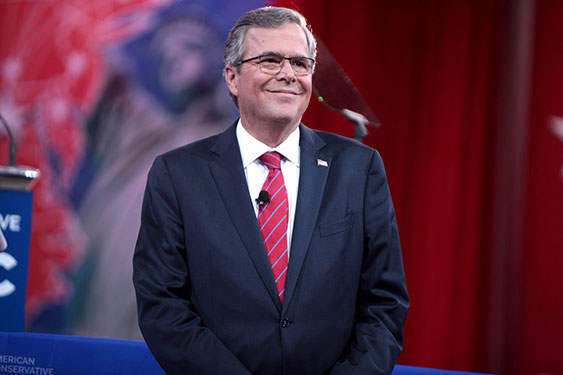Archived
Reform in the States: A Roundup
This is part of a series examining ethics, transparency and campaign finance proposals in the states. Washington, D.C. is the only place in the country where money-in-politics reform is a tough sell.…
Archived
Photo by Gage Skidmore
(Gov. Jeb Bush)Yesterday Governor Jeb Bush made headlines by saying, “If I could do it all again I’d eliminate the Supreme Court ruling,” referring to Citizens United. He added, “I would turn that on its head if I could.”
It’s encouraging to see 2016 candidates on both sides of the aisle talking about the country’s money in politics crisis. The candidates are using their platforms to speak to the overwhelming consensus across America that money in politics is an urgent issue that must be addressed.
What’s less encouraging about Gov. Bush’s “aha” moment on Citizens United is his proposed solution. Rather than encourage more small donations or tamp down on pay-to-play politics, Bush proposes eliminating all contribution caps to campaigns and full disclosure for all donations. These solutions point to Bush being less concerned about empowering more voices, and more frustrated with his super PAC’s ability to collect unlimited contributions while his campaign cannot. For what it’s worth, someone might remind Gov. Bush’s that donations to his super PAC, as well as to his campaign, are already fully disclosed.
To put it mildly, his solutions would do nothing address the real problems with our democracy. People no longer feel represented by their government, legislators spend too much time fundraising to do their jobs and special interests have ground progress on Capitol Hill to a standstill—these are all problems that Gov. Bush’s proposed solution will make much worse.
Unlimited contributions directly to campaigns would only disenfranchise even more Americans who would see the system as becoming more beholden to special interests with deep pockets. If secret money is Gov. Bush’s concern, he should be encouraging the Federal Election Commission (FEC), Securities and Exchange Commission (SEC), and Internal Revenue Service (IRS) to write, or in some cases simply enforce, rules that would increase transparency for dark money groups. Those are solutions that can be enacted right now, with or without Citizens United on the books.
Good for Gov. Bush for recognizing the dangers of Citizens United, but his next step must be to propose solutions that would actually right the ship. If he needs ideas, we’ve got more than a few in our Blueprints for Democracy report.
Issue: Money in Politics
Archived
This is part of a series examining ethics, transparency and campaign finance proposals in the states. Washington, D.C. is the only place in the country where money-in-politics reform is a tough sell.…
Archived
It’s no secret that campaigns are big money-makers. The 2012 election, the most expensive in history, cost over $7 billion — that’s a lot of buttons and yard signs. Through…
Archived
According to a recent New York Times/CBS News poll, Americans across the political spectrum are concerned about the influence of money in politics. 85% of respondents, including 81% of Republicans,…

